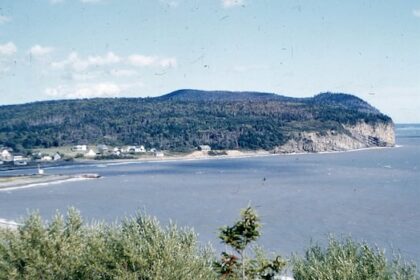British ColumbiaResidents on British Columbia’s upper Sunshine Coast are opposing an independent dam-generated power producer’s exclusive 30-year deal with a U.S. company. Tla’amin First Nation, city hope to attract potential businesses with access to power in wake of mill closureMaryse Zeidler · CBC News · Posted: Sep 24, 2025 8:00 AM EDT | Last Updated: 5 hours agoIn December 2021, the Powell River Catalyst Paper Mill was curtailed indefinitely, due to ongoing financial losses. (Submitted by Eldon Haggarty)A group of residents and a local First Nation on B.C.’s Sunshine Coast are trying to put a stop to a proposed exclusive 30-year deal between an independent hydropower producer and a U.S. company.Two dams in the area — at Powell Lake and Lois Lake, about 125 and 100 kilometres northwest of Vancouver, respectively — are operated by Powell River Energy Inc. (PREI), a subsidiary of Brookfield Renewable.The company has applied to the Canada Energy Regulator to export the power from its Powell River sites to U.S.-based company BR Pacific Hydro, an affiliate of PREI.”We need that power for local economic development now that our mill has been closed,” said Ellen Gould, president of Powell River-based Energy Democracy for B.C.”Powell River was founded because of the hydropower here. And so for it to be locked away into exports for 30 years is pretty devastating.”The group is encouraging those opposed to the deal to voice their concerns before the regulator’s Sept. 25 deadline for public feedback.CBC News reached out to Brookfield Renewable for comment, but it did not receive a response by deadline. Broken agreement, says Tla’amin NationThe hydro dams in Powell River were built in 1911 as a source of power for a paper mill that was the foundation of the region’s economy until 2021, when operator Catalyst Paper shut down operations indefinitely. Earlier this year, the local Tla’amin First Nation reacquired part of the site. The nation says the mill and the area around it, an area called tiskʷat, was its historic village.The nation said it plans to manage part of the land for cultural and environmental values, but will also develop some of it for industry. Another part of the mill was sold to Cranberry Business Park.Tla’amin Nation and Domtar representatives sign the tiskwat land agreement in Powell River, B.C., in a Friday, March 14, 2025, handout photo. From left to right, Tla’amin elder Elsie Paul, Hegus (Chief) John Hackett, Domtar’s president of pulp and tissue Richard Tremblay and Domtar director of Indigenous relations Lana Wilhelm. (Ethan Cairns/The Canadian Press)”This plan breaks the agreement we signed in good faith,” said Tla’amin Hegus (Chief) John Hackett in a written statement.”We expected the power from tiskʷat to support businesses, jobs, and opportunities for our people and the region. Instead, Brookfield wants to ship every megawatt south. During a trade dispute and rising demand for clean energy at home, selling out Canada’s future is unimaginable,” he said.Hackett says the company’s proposed deal contradicts the memorandum of understanding the nation signed with Brookfield, which included access to local power.This is Vancouver7:14What a historic land agreement means for the Tla’amin Nation and Powell River.A big land deal in Powell River is making history—giving the Tla’amin Nation back a major piece of its ancestral territory at the tiskwat mill site. But how did this agreement come together, and what does it mean for the Nation’s future? Stephen Quinn talks to Tla’amin legislator Erik Blaney about the long road to this moment, why it matters, and what’s next for the community.’The benefits are shipped away’Powell River Mayor Ron Woznow says he and his fellow city councillors opposed the deal as well.Woznow says the Cranberry Group has been actively rehabilitating the site and plan to develop it for industry. “I’m very confident that within a year there will be companies that will have signed on the dotted line and there will be a lot of that energy being used,” he said.”I have been involved in discussions with potential businesses from around the world who would like to come to Powell River on that site.”A paper mill is pictured in Powell River. (Submitted by Dillon Johnson)Energy Democracy for B.C. and the Tla’amin Nation say the dam is a huge disruption to the region, allowing the company to divert around 200 cubic metres of water per second from four rivers. “This threatens salmon habitat, fisheries, cabins, and the health of ecosystems that local communities depend on,” Hackett said.”Families here live with the environmental costs, while the benefits are shipped away.”Public utilityPREI has been shipping its power to the U.S. since the mill in Powell River shut down four years ago, via its affiliate Evolugen Trading and Marketing. The B.C. Utilities Commission says a hearing determined in December 2023 that PREI is a public utility — a decision the company has disputed and is currently under review at the B.C. Court of Appeal. In a written statement, the commission says it’s not aware of any other public utilities that own hydroelectric dams for the sole purpose of exporting power to the United States.”However, it is not uncommon for private companies in B.C. to operate generation facilities solely for their own use (and not for sale to the public or another corporation),” the commission said. “Such entities are not public utilities under the Utilities Commission Act.”Powell River, B.C., is about 125 kilometre northwest of Vancouver. (Government of B.C.)B.C.’s Ministry of Energy and Climate Solutions said the province is aware of PREI’s application to export its power.In a written statement, the ministry says B.C. Hydro is currently investigating whether it can acquire the power from the company’s facilities under the Canada Energy Regulator’s Fair Market Access policy.”B.C. Hydro is looking at ways to have clean power generated by the hydroelectric facilities available to meet domestic needs,” the ministry said.ABOUT THE AUTHORMaryse Zeidler is an award-winning reporter who covers news from Nanaimo and north Vancouver Island. Have a news tip? You can reach her at maryse.zeidler@cbc.ca.
Want to export dam-generated power to the U.S. for 30 years? Not so fast, say these B.C. residents











